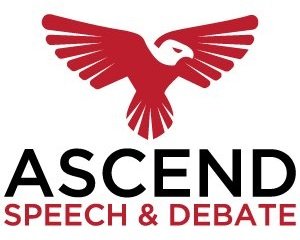The Value of Private Coaching: Why Great Coaching Supplements—Not Replaces—Your School Coach
In Congressional Debate, students hear a lot about “coaching.” School coaches, camp coaches, private coaching, and online resources all play a role in shaping a competitor’s growth. But something gets misunderstood along the way:
Private or camp-based coaching is not meant to replace a school coach. It’s designed to supplement the foundation your school coach has already built.
The reality is simple: the strongest, most consistent students in this activity usually have multiple layers of support—and each one plays a different role. At Ascend, we’ve seen firsthand how private coaching or continued mentorship bridges the gap between learning skills once and using them effectively all season long.
Below are the three core benefits of continued, individualized coaching—and why they matter more than many students realize.
1. Coaching Reinforces Fundamentals (So Students Don’t Outgrow Their Foundation)
As students get better at debate, they often leave the basics behind. Not intentionally—just naturally.
They get more creative.
They get more confident.
They get more experimental.
But with that confidence sometimes comes sloppy habits:
Wandering structure
Evidence that becomes less rigorous
Cross-ex that gets flashy but unfocused
Speeches that sound impressive but lack true depth
Effective coaching keeps students grounded in the fundamentals they learned when they first entered the activity.
Even national-level debaters need reminders about structure, clarity, warranting, and responsiveness. Fundamentals are not beginner skills—they’re winning skills. And when someone is keeping a student accountable to those basics, they avoid developing the bad habits that stall growth later.
2. Coaching Helps Students Build an Authentic, Natural Style
Many students struggle with something they rarely admit:
They don’t know what their speaking style actually is.
So what happens?
They copy the kid they admire.
They mimic the “fast talker,” the “animated entertainer,” or the “dry analyst.”
They force themselves into a persona that doesn’t fit.
A great coach helps students figure out who they are as a speaker.
That means:
Learning their personality
Understanding how they think
Helping them speak in a way that feels natural
Refining a style that amplifies their strengths
Authenticity isn’t just about comfort—it’s about success. Judges respond better to students who sound like themselves, not like a replica of someone else. And students enjoy the activity more when they’re not performing a character.
With consistent coaching—whether at camp or throughout the year—students develop a style that’s sustainable, genuine, and effective.
3. Coaching Raises a Student’s Floor (So They Avoid “Disaster” Tournaments)
Every competitor has a bad tournament at some point.
Sometimes it’s nerves.
Sometimes it’s prep.
Sometimes it’s inconsistency.
But students with strong coaching have a much higher floor—meaning their worst tournament is still solid.
Why?
Because coaching ensures:
Prep is reviewed
Arguments are sound
Cards are clean
Structure is sharp
Rebuttals are practiced
Strategy is aligned
It’s not just about raising the ceiling of a student’s best performance—it’s about making sure the worst performance is never catastrophic.
Prep review + tournament readiness = fewer surprises and far more consistency.
A Real Story: The Student Who Soared… Then Slipped
We once had a student—name withheld—who came to Ascend for the summer.
They absorbed everything.
They were focused, hardworking, and determined.
And their results exploded.
First semester tournaments?
Finals.
Top ranks.
Victories.
But after that first semester, the success faded just as quickly as it arrived.
Not because they were any less talented.
Not because they cared any less.
But because nothing reinforced the skills they gained at camp.
Without ongoing coaching, they drifted away from the fundamentals that made them great.
Their structure slipped.
Their prep became inconsistent.
Their mindset shifted from disciplined to improvisational.
A private coach—or even free Ascend Academy sessions—could have kept them grounded, accountable, and steadily improving. Instead, they tried to maintain the skills alone, and debate is rarely mastered in isolation.
This story is common.
And preventable.
Coaching isn’t about talent—it’s about reinforcement.
Conclusion: Coaching Builds Better Debaters, But More Importantly, Better Communicators
Private coaching and camp-based support are valuable not because they replace a school coach, but because they reinforce the foundation your school coach already built.
School coaches are the backbone of this activity.
Additional coaching is the scaffolding that helps a student climb higher, safely and consistently.
When all three levels—school coaching, camp coaching, and private coaching—work together, students develop:
A strong foundation
A clear, personal speaking style
A consistent performance level
A deeper love for the activity
The result?
Students who not only excel…but sustain success.
